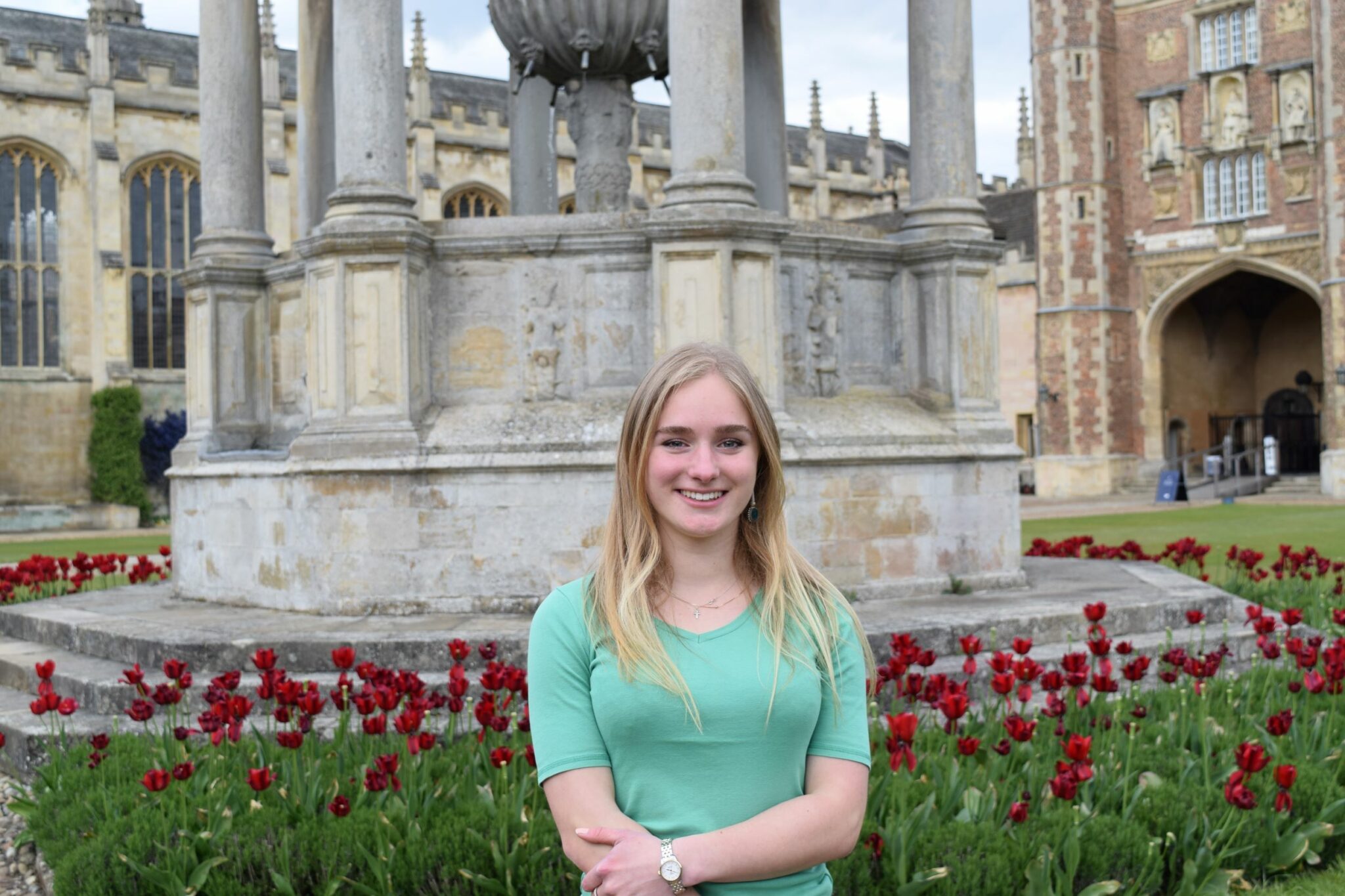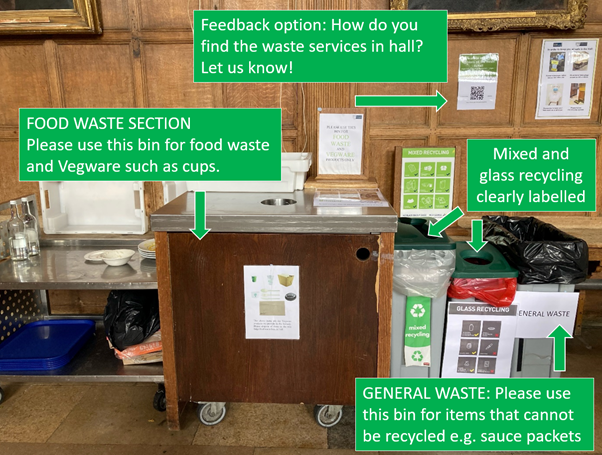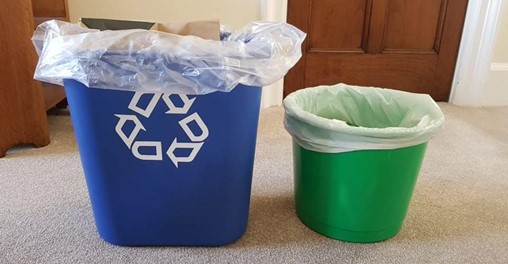
Divestment
In February 2021 Trinity College announced full divestment from fossil fuels and a commitment to net zero carbon emissions by 2050, in line with the spirit of the Paris Agreement.
Trinity College’s endowment has a dual mandate: to continue delivering sustainable income growth and to commit to a significant, lasting, and positive impact on improving its environmental footprint and achieving net zero before 2050.
Our college is going far beyond simply divestment from fossil fuels and are taking action to reduce carbon emissions within its property portfolio which will offer significant opportunities to invest in ways that will have a positive impact on the environment.
Read more here: Trinity commits to net zero by 2050 and divestment from fossil fuels – Trinity College Cambridge
Trinity’s Senior Bursar Richard Turnill talks more about Trinity’s divestment plans in the short video below:
Catering
Trinity College Catering department are doing wonderful work to try to improve their sustainability and environmental impact. They ensure that their activities not only comply with environmental regulations but exceed them wherever possible in every aspect of their operations.
Here are 10 positive things that they are doing…
1. Employing a specialist vegetarian/vegan Chef.
2. Using Fairtrade products and increasing the provision of Fairtrade goods where possible.
3. Providing local and seasonal fruit and vegetables wherever possible.
4. Using local supply chains; Fruit and Vegetables, Meat and Poultry and Fresh Fish are all within 35 miles of the College.
5. Providing meat, poultry, dairy and eggs from sources using practices that conform to high environmental, social and animal welfare standards.
6. Have replaced traditional “solid top cooking ranges” with induction cookery units, installed LED lights, and purchased equipment A rated for energy consumption, wherever possible.
7. By summer 2021 will have phased out all single use plastics – even the Christmas crackers are biodegradable!
8. Working closely with Oleco Waste Solutions to ensure that all used cooking oil is collected and turned into bio-diesel.
9. Minimising energy and water consumption through efficient administration, equipment selection, usage and disposal, food storage, preparation, and cooking.
10. Any unavoidable food waste is collected daily and sent to a local unit for turning into usable compost, or sent to an anaerobic digestion plant.
As well as this, students at Trinity have formed a Vegetarian and Vegan Working Group to improve the increase the variety of such meals served in hall. So far, the group have made changes to the menus, introduced new meals, and are often invited by the catering department to taste-test trial meals. If you’d be interested to join, and would like to help in any way, please email environment@tcsu.net and ask to be added to the mailing list.
Energy
Trinity is now a member of the University consortium who use ‘SmartestEnergy’ for their electricity supply. While the supply of electricity to the College is only as ‘green’ as the grid (perhaps 50%), the use of this supplier means that Trinity is contributing to the demand for their electricity and thus encouraging their growth and thus the proportion of green electricity in the grid. SmartestEnergy input to the grid, based largely on solar energy, is 100% green and certified by the Carbon Trust.
Cambridge University
Want to know more about what The University of Cambridge is doing? Check out their ambitious new climate initiative: Cambridge Zero.
Climate Change and a Carbon Neutral Future | Cambridge Zero | University of Cambridge
WHAT CAN I DO AS A STUDENT?
Recycling
At Trinity college we have extensive recycling facilities. Below is more information on what and where to recycle:
Recycling station in hall

College room recycling: both mixed recycling collections and general waste

Nearest battery recycle collection point is in Mainsburys.
Carbon Footprint
A useful way of learning about how to reduce your personal carbon footprint is by tracking it on a carbon calculator.
There are many carbon calculators online, however TCSU and the BA society use one called GikiPro: a free super-detailed and science-based carbon footprint calculator that helps you to track and reduce your carbon footprint.
Giki Zero Pro: Team up to cut carbon footprints | Giki Zero
GikiPro shows you where you use most CO2 and suggests areas that you can try to reduce your emissions. Its quick and easy to use – and very interesting!
Travel
Interested in the carbon emissions of your journey to college this term?
Calculate the emissions from your train journey:
LNER Carbon Footprint Calculator | LNER
Or find out how many kgs of CO2 are generated by plane:
Find out how much CO2 your flight will emit | Flights | The Guardian
Flight Emissions Calculator | See how much CO2 your flight emits
The above link compares with how many years it would take for 1 tree to absorb that much carbon, as well as how far you could drive in the average car.
Although these are, of course, not 100% accurate, it may give you a rough understanding of your travel emissions.
What can I get involved in?
There are a multitude of opportunities to get involved with if you are interested in environmental issues or would like to learn more.
Trinity College opportunities
Trinity Ethical and Green Affairs (TEGA): a society for anyone at Trinity who is interested in the environment, sustainability, and other ethical causes. They look for ways to improve both their individual and Trinity’s environmental and social impact as well as hosting speaker events.
Facebook: Trinity Ethical and Green Affairs | Facebook
Instagram: TEGA (@trinityethicalgreenaffairs)
Trinity Responsible Investment Society: a group of Trinity College students and fellows interested in making positive change through the College’s investments.
Facebook: Trinity Responsible Investment Society | Facebook
Climate Change Working Group: A group of undergraduate, BA, and PhD students, and fellows who meet to discuss Trinity College’s environmental impact, and research ways to improve it. Please get in touch with the TCSU Environmental Officer environmental@tcsu.net if you are interested in getting involved.
Wider university opportunities
Zero Carbon Cambridge: The main student led Environmental group at the university
Website: Zero Carbon Cambridge (zerocarbonsoc.soc.srcf.net)
Cambridge Carbon Literacy: an informative and interesting free course about the climate emergency, gain an internationally renowned qualification in carbon literacy.
Website: Cambridge Hub | Cambridge Carbon Literacy Project
Engage for Change: Learn to make change happen through effective and transformative engagement with others with this 12-week programme.
Website: Cambridge Hub | Engage for Change
Cambridge Hub: check out the Cambridge Hub which offers students volunteering opportunities to contribute towards tackling social and environmental issues in the Cambridge community.
Website: Cambridge Hub | Welcome to the Hub
